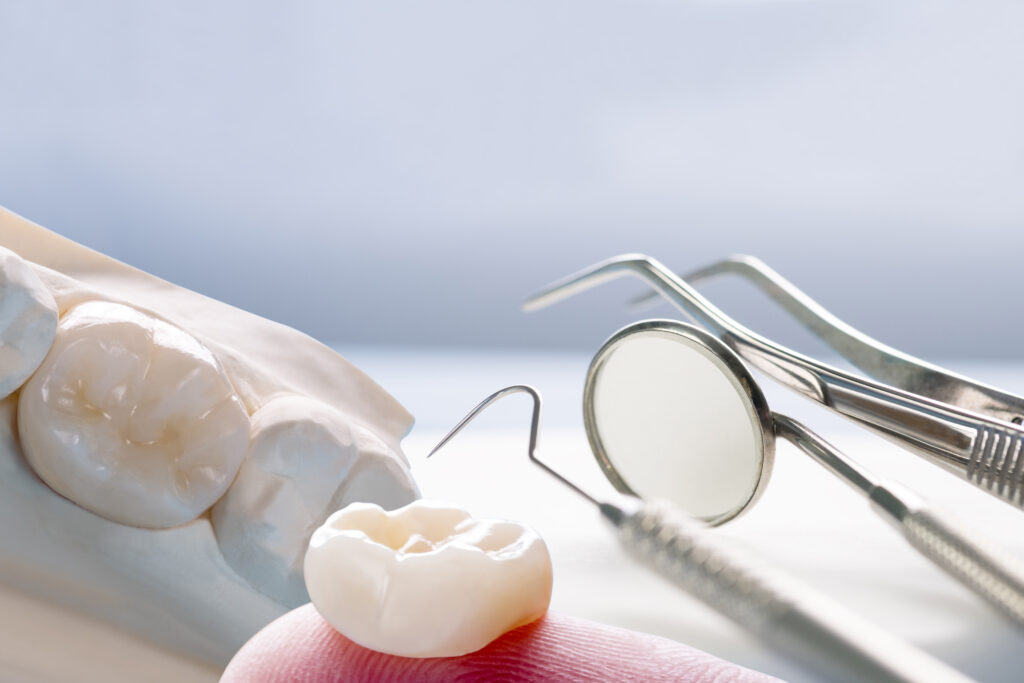Dental crowns are a highly efficient treatment for repairing a damaged tooth. Dental crowns and bridges offer several benefits as tooth decay solutions. In this article, Harvard Square Dental Care examines Yolanda Smith’s list of advantages and disadvantages of dental crowns.(Source: News Medical Life Sciences, Advantages and Disadvantages of Dental Crowns, by Yolanda Smith, B. Pharm, reviewed by Dr. Liji Thomas, MD, https://www.news-medical.net/health/Advantages-and-Disadvantages-of-Dental-Crowns.aspx#:~:text=Dental%20crowns%20are%20a%20good,or%20no%20treatment%20at%20all. ).
Dental crown pros
Yolanda Smith advises that dental crowns are a versatile solution for various dental problems, including decay, wear, root canal procedure, cracks, dental implants, and improving tooth appearance. They are durable and can last for 5-15 years, leading to high patient satisfaction. Scientific studies have demonstrated the high success rate of dental crowns compared to other restoration methods or no treatment.
Harvard Square Dental Care shares, “Dental crowns offer several advantages, including the following:
Versatility: Crowns can be used to treat a wide range of dental problems, from decay to cracks to improving tooth appearance.
Durability: They are a long-term solution that can last for up to 15 years, providing excellent value for money.
High success rate: Studies have shown the effectiveness of dental crowns is higher when compared to other treatments.
Protection: Crowns can protect damaged or worn teeth from further damage and decay.
Aesthetics: They can improve the appearance of teeth by changing their shape or colour.
Comfort: Crowns are custom-made to fit perfectly and feel natural in the mouth.
Low maintenance: Crowns can be cared for just like natural teeth, with regular brushing and flossing.
Dental crown cons
Yolanda Smith explains that while dental crowns have several advantages, a few potential disadvantages are there as well to consider. These include the irreversible filing of the tooth to fit the crown and discomfort or sensitivity after the procedure. Chipping of porcelain crowns, possible loss of cement holding the crown in place, and potential for allergic reactions to the materials used are probable. Dental crowns can also be more expensive than other restoration options.
Harvard Square Dental Care reiterates, “There are some situations where alternative tooth decay solutions may be more appropriate than dental crowns. This is when a tooth is severely decayed and cannot support a crown. It could also be detrimental when a patient has a known allergy to the materials used in the crown. Your oral health care provider will be able to guide you on this.”
What should you do?
Yolanda Smith suggests that in order to ensure the best treatment recommendation and procedure for each individual, it’s crucial to understand their oral health care need. For instance, when it comes to restoring a missing tooth between healthy adjacent teeth, a bridge with crowns may provide greater stability compared to removable partial dentures.
Harvard Square Dental Care elaborates, “Implants are now considered a superior alternative to crowns if cost is not a constraint. They do not impact the healthy adjacent teeth and have a lower risk of infection under the bridge. Therefore, if a patient can afford a dental implant, that may be the preferred option. On the other hand, if they prefer a more affordable option, a combination of dental crowns and bridges might be the way to go.”
Harvard Square Dental Care concludes, “It is important to weigh the pros and cons of dental crowns and bridges when deciding on the most suitable treatment. Consult your oral health care practitioner for effective tooth decay solutions for your condition.”


0 comments on “Considering a Dental Crown?”